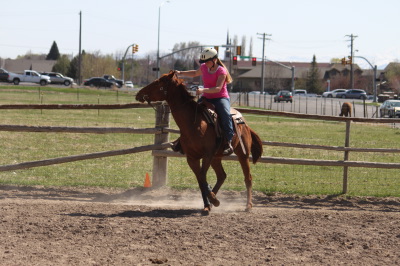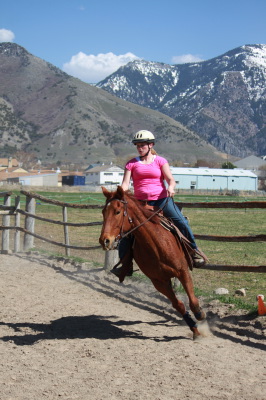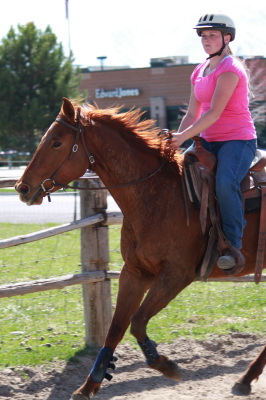Class teaches students how to get on that horse and ride
Whether it is flying over jumps, training young horses or just learning the basics of riding, the USU Equine Science program has it all. The three main riding classes date back to the ‘60s, but they originally only taught Western riding. After Rebecca Lewis took over the classes, she decided to change the curriculum to include English riding. Now the program learns many Western disciplines, such as Western pleasure, trail and reining, but also includes the English dressage and jumping, as well.
Lewis has been the riding instructor for four years at USU, and does not just handle the stresses of teaching, she also trains the horses to sell to prospective buyers, keeps track of all the students involved in the program and leaves some time for doing stable chores. With around 35 horse to take care of, many students in the program are also employees at the stables.
Katie Hepworth, junior in equine science, said, “I practically live here. It’s my second home.”
The main focus of the beginner and advanced riding classes are to help the students not only learn to ride better, but to learn how to work with the horses.
“A lot of the students here have come in already knowing how to ride, but they just know the how,” Lewis said. “We try to teach a lot of the why we do things and how what we do affects the horse.”
The classes are currently maxed out at 14 equine science majors, but the program is hoping to expand and include more sessions once the new facility is complete. The new Equine Science Facility, scheduled to finish in August, is going to be much larger than the old stable and will allow for horse breeding, which will help with class curriculum and program funding. The program receives all its horses through donation and does not allow outside breeding, including at the new facility.
“Outside boarding is a liability. It is a liability for the program, the horses and the boarders,” Lewis says.
Since the program just recently became a full major, the size of staff and students is still quite small, but they are constantly trying to expand. Colette Tebeau, the other riding instructor, has really enjoyed her time teaching in the program.
“We try to tailor a lot of our classes to what students already know, and then the students expand and develop that knowledge,” she says.
The beginning class starts with a quick 10-minute lecture, then proceeds to hands-on training. First, the beginners learn grooming techniques, saddling instructions and, finally, the riding.
“I love watching the students progress from not knowing anything to being fairly confident riders,” Tebeau says.
Since every class is hands-on, safety is a big issue, for the horses and riders. The riders are required to wear riding helmets at all times, and every precaution is taken to make sure the students and horses stay protected.
The program receives funding through the department and student fees, but the largest chunk is from the sale of horses. Lewis sells five to eight horses a year, all which come from donation, though they will not just take any horse. Most every horse they will accept has breed papers, and they will not take anything over 18 years old. Horses with papers sell much better.
The program includes a wide range of horses. While most of the riding horses are stock horses, quarter horses and paints, the herd also includes an Arabian, two mustangs and an appaloosa mix. Some horses are young and have been trained by the students in the colt starting class this year.
“We bring them in, get them trained and then turn around and sell them,” Lewis says.
In the future, the Equine Science program hopes to expand the classes, the studefnts and the horses. But for now, it helps the students learn the best way they possibly can. Hepworth believes in the program, the teachers and, most definitely, the horses.
“I’ve learned so much being here,” Hepworth said. “The teachers are great, the atmosphere is great and my riding has improved so much.”
– kellyn.anderson@aggiemail.usu.edu




